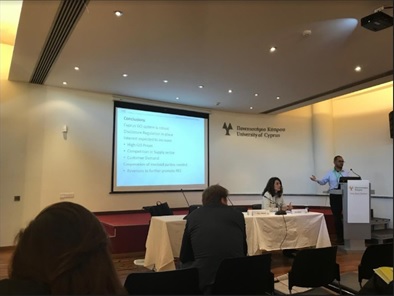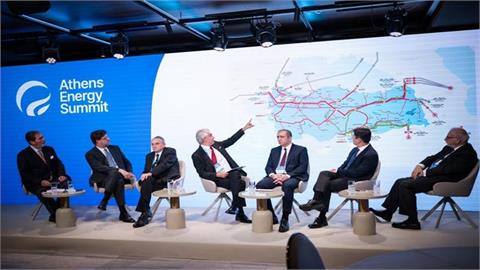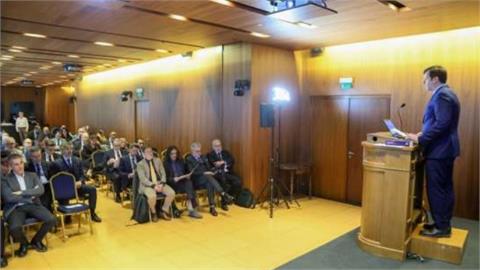IENE participated in the high-level “6th International Conference on Renewable Energy Sources (RES) and Energy Efficiency”, which was held on November 1 and 2, in the University of Cyprus in Nicosia
IENE was represented by its Head of Research, Mr. Dimitris Mezartasoglou, who attended the Conference and presented a paper on the challenges and lessons that should be learned regarding further RES deployment in SE Europe.
Mr. Mezartasoglou referred to the significant RES and energy efficiency potential in the SE European region. More specifically, in terms of RES, further development in all of its application areas (i.e. solar, wind, biomass, hydro and geothermal) is required without necessarily aiming to adhere to specific targets (set by the EU). In terms of energy efficiency, its promotion in SE Europe focuses primarily on the residential sector, where the biggest part of region’s energy consumption takes place. He also stated the existence of several support schemes for RES in SE Europe that can be divided into investment support, including capital subsidies and tax exemptions or equipment price reductions, and operating support, including feed-in tariffs (FiTs) and green certificates. For instance, FiTs have become increasingly common in SE Europe, with a number of countries having already implemented a FiT.
Mr. Mezartasoglou highlighted the cases of Greece and Bulgaria that both introduced exceptionally high FiTs without a proper financial analysis and cash flow projections showing the impact that RES would have on the national accounts and electricity market operation over the long term. This phenomenon had a dramatic impact on the electric system leading to large financial deficits for the market operator and with huge delays experienced by producers in getting paid by the operator. The retroactive changes effected in Bulgaria and Greece are part of a wider trend seen across Southern and Southeast Europe, where governments moved very swiftly at an initial phase to embrace RES. In addition, Romania decided to slash incentives for RES generation following a dramatic boom in the sector between 2010 and 2013. Bucharest’s generous "green certificate” incentive scheme attracted numerous international investors from Europe and Asia, in addition to local companies. However, in June 2013, the Romanian government announced cuts to green certificates issued to generators of wind, solar and small hydropower plants put into operation after January 1, 2014. This resulted in new projects being cancelled, while many of those already under construction were put on hold.
The slowing of RES applications over the last 3-4 years has raised questions about whether countries in the region will meet medium- and long-term RES targets. The abrupt changes to incentive schemes have discouraged many investors and it is uncertain whether they can be lured back. It would have been better for the countries to maintain a stable and predictable system so that investors know the longevity of the incentive systems set up over a number of years. This is possible and has the benefit of encouraging investors into RES. It should also be mentioned that the higher penetration of RES in the electrical system of a country, the greater must be the transformation of the electricity network as a whole. Again, something that is not happening in countries such as Romania, Bulgaria and Greece which have experienced strong RES penetration in recent years, but now face limits to higher RES utilisation.
In his presentation, Mr. Mezartasogloualso stressed the importance of energy storage, which is already a reality in the region and more specifically in non-interconnected systems (e.g. Greek Islands) where systems based on RES and storage can be a competitive alternative to fossil (diesel) fuel, while thermal storage can be another source of flexibility, both on the grid and the household level in SE Europe.
The Conference was attended by members of research centers and academic communities, architects, engineers and energy consultants, representatives of international organizations and private-owned companies as well as individuals, among others, who were willing to be informed on new developments, tools and techniques in terms of RES and energy efficiency. The 6thInternational Conference on RES and Energy Efficiency follows the five successful editions held in Nicosia (i.e. 2007, 2009, 2011, 2013 and 2016).
Deloittewas the main sponsor of the two-day Conference, organized by Cyprus Chamber of Commerce and Industry, with the contribution of the Embassy of the Kingdom of the Netherlands, EOSOLAR, EOS Project and Maritime Institute of Eastern Mediterranean, while communication sponsors were Cyprus’s largest publishing group, Phileleftheros, and Cyprus’s Broadcasting Corporation.




